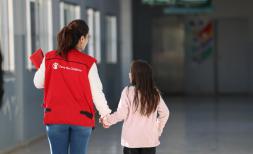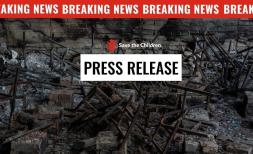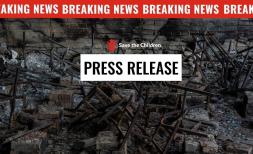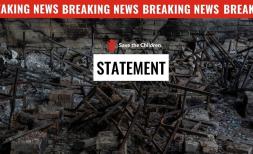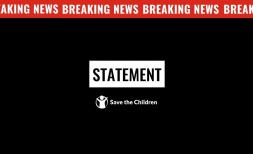UKRAINIANS COLLECT WATER FROM PUDDLES IN KHERSON AS EXPLOSIVES, SHELLING CUT OFF SUPPLIES
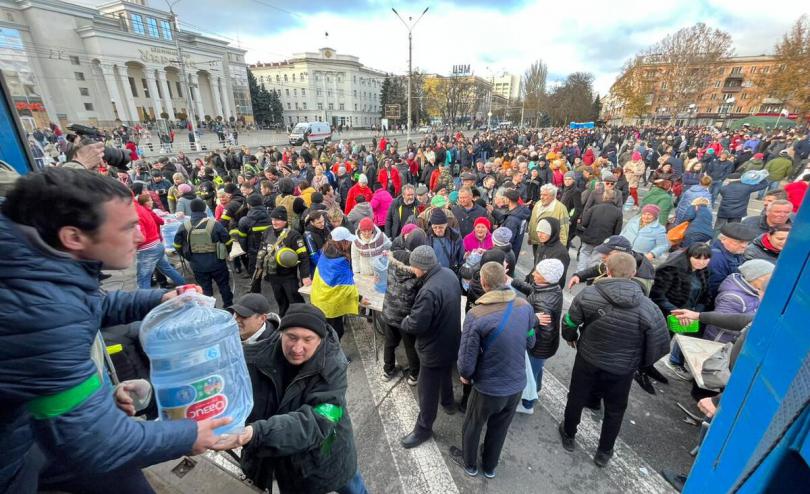
Save the Children distributes drinking water to more than 4,000 families in Kherson, Ukraine. More content available here
Families in Kherson have been collecting water from puddles and queuing for more than a kilometre to buy drinking water and fuel for heating due to destroyed infrastructure with at least another month of disruptions expected, Save the Children said.
More than 165,000 people, including about 80,000 children, live in areas of Kherson that have recently been retaken by Ukraine, and the needs among the population are at critical levels due to ongoing hostilities, extensive damage and destruction of infrastructure.
Georgia Tacey, Save the Children Programme Director in Ukraine, said:
“Families have not had water and electricity for over two weeks, markets are running low on food and water, and most shops are empty. Pharmacies and health facilities have no medicines, and people can only rely on locally produced fruits and vegetables, if available, to feed themselves.
“The hospital we saw had much of its equipment looted, including surgical equipment and tables, medicine, wheelchairs and frozen food and water supplies for patients. The situation Kherson faces is now dire and the levels of need are enormous. We have managed to reach more than 4,000 families with water in a single day but so many more are in need.”
In spite of efforts by the local authorities to facilitate humanitarian access and restore some services, Save the Children said there was no realistic way of reaching all of the people who are in need of assistance across Kherson. Families must be allowed to leave and go to areas with better services without coming under fire.
It will take weeks or even months before all the essential services like electricity, central heating and water supplies in Kherson are restored to full capacity. Last week, the government of Ukraine approved funding of US$2.1 million to repair the region’s critical infrastructure, but the works can only start once the territory is decontaminated from explosives. This may take up several weeks, according to Ukraine’s Ministry of Internal Affairs.
Save the Children calls on warring parties to respect international humanitarian law and international human rights law and avoid attacking civilians and civilian infrastructure. Attacking water and power stations are prohibited in the international rules of war, and within the Russian Federation and the Ukraine’s IHL manuals.
This weekend, Save the Children distributed drinking water to more than 4,000 households in Kherson, while also registering families in need of cash assistance that the organisation will support in the coming weeks and months.
The aid organisation is working to ensure stable water supplies in parts of Ukraine affected by combat, including delivering submersible pumps to a water utility in the city of Sumy, supplying water filters to Mykolaiv and Kherson regions, drilling boreholes, installing manual water pumps, and repairing a water intake facility in Chernihiv region. The child rights organisation has also assisted in plumbing repair works and distributing bottled water and hygiene kits.
Save the Children has been operating in Ukraine since 2014, delivering humanitarian aid to children and their families. It is now supporting refugee families across Europe and helping children to access education and other critical services.
Notes:
- The Ukraine Protection Consortium (funded by BHA/USAID) led by Save the Children is providing holistic life-saving Health, Shelter, Cash, Protection, WASH and Nutrition assistance to conflict affected people living in Ukraine. The Consortium is a collaboration of local and international organizations who specialize in protection-based programming in humanitarian contexts and are working in host communities, collective centres and newly accessible areas.
